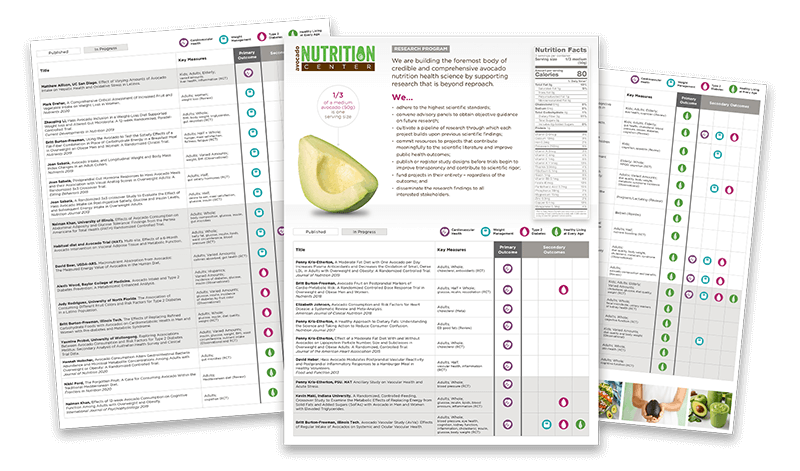Nutrition Research
Nutrition Research
Learn the latest on avocado nutrition health science
Find nutrition research on the benefits of avocados for cardiovascular health, weight management, type 2 diabetes, and healthy living at every age
Topics
View Showing 1 – 9 of 49 studies
Research Initiative
Using the avocado as an evening snack to investigate whole food matrix and macronutrient composition on morning metabolic indices in adults with prediabetes
What’s Inside: Can an avocado snack at night support better morning metabolism? 🥑 This new study explores how whole food structure and macronutrient composition impact metabolic markers in adults with prediabetes. The findings might surprise you. 👀
Research Initiative
Avocado consumption during pregnancy linked to lower child food allergy risk: prospective KuBiCo study
What’s Inside: Maternal exposures during pregnancy play a critical role in offspring’s health outcomes. This study aimed to investigate how maternal avocado consumption during pregnancy relates to offspring allergic health outcomes using the Kuopio Birth Cohort (KuBiCo) Study.
Research Initiative
Effect of Daily Avocado Intake on Cardiovascular Health Assessed by Life’s Essential 8: An Ancillary Study of HAT, a Randomized Controlled Trial
What’s Inside: This study examined the effect of daily avocado intake for 26 weeks on the American Heart Association's cardiovascular health score (LE8). Learn what avocados can do for diet quality, sleep health, and blood lipids.
Research Initiative
Impact of daily avocado consumption on gut microbiota in adults with abdominal obesity: an ancillary study of HAT, a randomized controlled trial
What’s Inside: Did you miss this one? This study aimed to investigate short-term and long-term impact of avocado consumption without caloric restriction on the gut microbiota of free-living adults with abdominal obesity.
Research Initiative
Adherence and Body Weight with Daily Avocado Consumption Among Latina Women of the Habitual Diet and Avocado Trial (HAT)
What’s Inside: The aim of this study was to examine the adherence, changes in weight, and, waist circumference associated with the daily consumption of a culturally preferred food, namely an avocado, among Hispanic/Latina females in the Habitual Diet and Avocado Trial (HAT).
Research Initiative
The Effect of Daily Avocado Intake on Food and Nutrient Displacement in a Free-Living Population with Abdominal Obesity
What’s Inside: This secondary analysis, conducted using dietary data from the Habitual Diet and Avocado Trial, sought to assess the effect of consuming a large avocado (168 g, 281 kcal) daily in the avocado-supplemented diet (AD) group compared with the habitual diet (HD) group on food and nutrient D.
Research Initiative
Effect of daily avocado consumption for 6 mo compared with habitual diet on red blood cell fatty acid profiles and association with cardiometabolic risk factors in individuals with abdominal obesity: a randomized trial
What’s Inside: To compare the effect of consuming 1 avocado/d relative to habitual diet (HAB) on RBC-FA profiles, and their association with visceral adiposity and cardiometabolic risk factors in individuals with abdominal obesity.
Research Initiative
Association between avocado consumption and diabetes in Mexican adults: Results from the 2012, 2016, and 2018 Mexican National Health and Nutrition Surveys
What’s Inside: Avocado contains numerous vitamins, minerals, and phytochemicals, which can contribute to reducing the risk of metabolic syndrome and diabetes. However, limited studies have examined the association between avocados and diabetes risk.
Research Initiative
Avocado intake and cardiometabolic risk factors in a representative survey of Australians: a secondary analysis of the 2011–2012 national nutrition and physical activity survey
What’s Inside: Avocados are a rich source of nutrients including monounsaturated fats, dietary fibre and phytochemicals. Higher dietary quality is reported in studies of consumers with higher avocado intakes. The present study aimed to examine avocado consumption and cardiometabolic risk measures in a representative sample of Australian adults.














